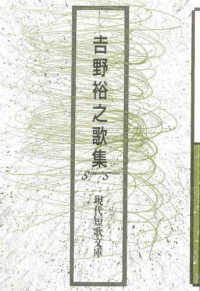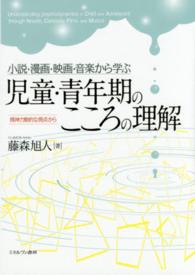- ホーム
- > 洋書
- > 英文書
- > Philosophy
Full Description
Human rights, viewed as universal moral rights since the 1948 Universal Declaration, are increasingly examined in relation to non-Western traditions. This edited volume explores the intersection of East Asian philosophies - Confucianism, Buddhism, and Daoism - with human rights discourse, examining whether these ancient traditions can accommodate universal values while preserving their core philosophical foundations.
The collection features scholarly analyses of how traditional East Asian thought engages with contemporary human rights, including privacy rights, environmental rights, and epistemic rights. The work demonstrates how these philosophical traditions offer unique interpretations that both challenge and enrich Western paradigm of human rights. The volume provides critical insights into cross-cultural dialogue and the potential for more inclusive global human rights frameworks.
This book serves philosophers, political theorists, human rights scholars, and scholars of Asian intellectual traditions. It appeals to those researching multicultural approaches to human rights, comparative ethics, and the dialogue between tradition and modernity.
Contents
Introduction for Human Rights and East Asian Philosophy: Traditional and Recent Approaches Section 1: Human Rights and Confucian Perspectives 1. Reconciling International Legal Human Rights and Confucianism: A Consequential Evaluation to Political Participation and Privacy 2. Confucian Strong Harmony and Human Rights 3. Confucian Conception of Human Rights 4. Confucianism on Liberty, Political Participation and the Foundation of Human Rights: the Hong Kong Perspective from Ho Kai and Hu Liyuan 5. Epistemic Rights: A Confucian Perspective 6. Epistemic Rights as Human Rights in the Age of Artificial Intelligence: A Confucian Perspective Section 2: Human Rights: From the Buddhist and Daoist Perspectives 7. Buddhism and Human Rights: A Critical Survey 8. Buddhist Doctrine of No-Self and Human Rights: Compatible or Incompatible? 9. Group Identity and Group Right: A Reflection Through a Buddhist Lens 10. Zhuangzi, Freedom, and the Ability to Change Perspectives: A Daoist View of the Right to Education 11. A Daoist and Confucian Approach to the Environmental Right of Future Generations








